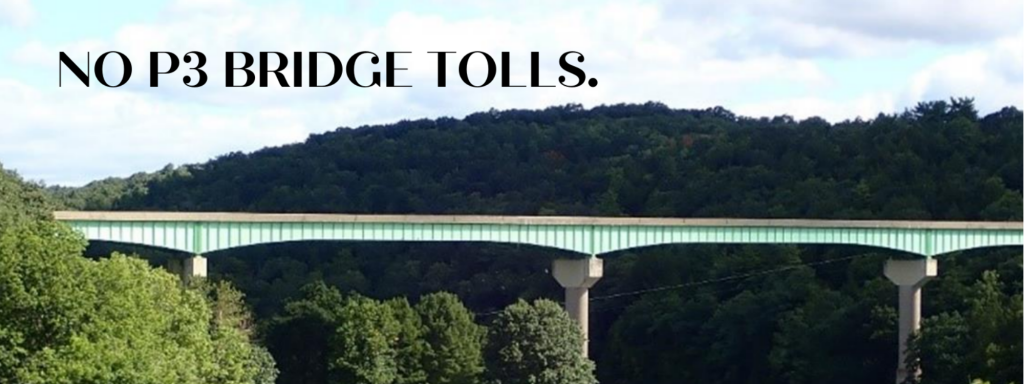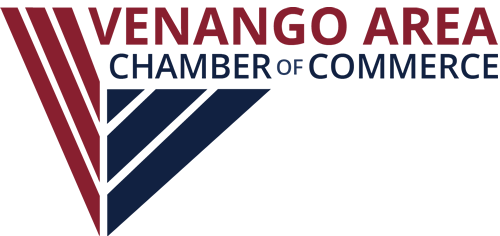
Meet the Coalition
In the News
Click Here to Sign the Petition
Calendar

On November 12, 2020, the Pennsylvania Public Private Partnership (P3) Board approved the Major Bridge Initiative, to use the P3 delivery model for bridges in need of rehabilitation or replacement. The P3 Board was created by Act 89 of 2013 in conjunction with the increase in the Pennsylvania’s gas tax, the second highest in the country. PennDOT is implementing these tolls to offset the shortfall in infrastructure funding that is not currently being met by the recently passed federal funding and the state gas tax.
PennDOT has identified nine candidate bridges:
• I-78 Lenhartsville Bridge Replacement Project (Berks County);
• I-79 Widening, Bridges and Bridgeville Interchange Reconfiguration (Allegheny County);
• I-80 Canoe Creek Bridges (Clarion County);
• I-80 Nescopeck Creek Bridges (Luzerne County);
• I-80 North Fork Bridges Project (Jefferson County);
• I-80 Over Lehigh River Bridge Project (Luzerne and Carbon counties);
• I-81 Susquehanna Project (Susquehanna County);
• I-83 South Bridge Project (Dauphin County); and
• I-95 Girard Point Bridge Improvement Project (Philadelphia County).
The No P3 Bridge Tolls Coalition is a group of concerned local chambers, economic development entities, statewide business organizations, business leaders, affected community leaders, and citizens. We stand opposed to the tolling of these nine bridges because of the effect it will have on our local and statewide economy and to stop PennDOT from using this version of the P3 process from negatively impacting more communities in the future.
The coalition supports finding long-term, sustainable solutions for PennDOT’s infrastructure funding needs. We don’t support this inequitable patchwork approach that unfairly overburdens a few local communities.
Why Should You Oppose the Tolls?
- Traffic Congestion and Public Safety
- Vehicles will divert to avoid tolls will affect Main Street Businesses by creating more traffic with less parking which will deter customers and create rapid and costly deterioration of the roadways.
- Emergency Medical Services (EMS)-tolling and diverted traffic will impact response times on an already short-staffed and under-funded emergency services.
- Increased Costs to Citizens and Businesses
- The cost per bridge toll is estimated to be $1-$4/car and $8-$12/truck and other large wheelbase vehicles including RVs. According to the Pennsylvania Motor Truck Association, the cost to operate a truck in PA will increase by over $6,000 annually. These costs will be passed on to consumers, exacerbating an already inflated market.
- Tolling expenses will create a financial burden to businesses who will be required to pay tolls. Businesses in PA could simply choose to relocate to avoid these burdensome tolls or to never locate in PA at all. These tolls would do even further damage to our statewide and local economies.
- Electronic Tolling Problems: PennDOT plans to rely on the same toll collection technology that cost the PA Turnpike over $104 million in uncollected tolls in 2020. The cost to collect Turnpike tolls exceeds 20% of the actual revenue collected.
- Who’s Next? Once PennDOT and the P3 Board have established the authority to institute these tolls, they will replicate this model across the Commonwealth. You may not be directly affected by one of these nine bridges today, but your community could be next on PennDOT’s list.
Toll Management
- PennDOT has chosen a consortium of six companies, led by an Australian firm. This effectively hands the management, control, and funds gathered from the nine bridges to international entities. This loss of control to foreign entities is very concerning.
- Embedded within the contract for the tolling company is a provision that guarantees specific annual revenues to the company. Should that not be met, Pennsylvania will owe the company the difference, out of the already depleted Motor License Fund.
- Based on PennDOT’s own estimates, the money needed to repair the majority of the nine bridges will be collected in the first year of tolling. The tolls are currently slated to be in place for 30 years. The remaining funds will go for “administrative and maintenance” fees to the management company. PennDOT hopes to be able to use some of the funds generated for other projects within the local transportation district, but the legality of that remains in question.
Sign the Statewide Petition and Join the Coalition (email link coming soon) today!
In The News:
Resources:
Follow the “No P3 Bridge Tolls” Facebook Page
Stop the Tolling of I-80 Task Force Presentation by Precision Imagery
PennDOT Project Information (Clarion County)
PennDOT Project Information (Jefferson County)
